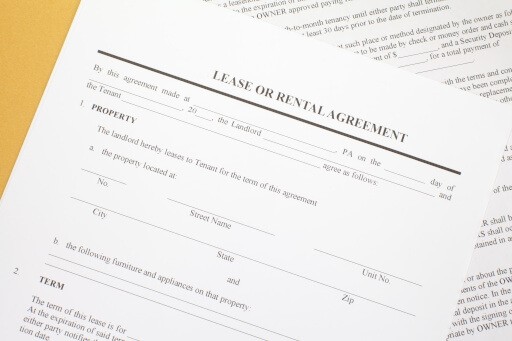Sometimes, ending a lease early is unavoidable, even as the landlord. If you find yourself in a situation where you need to break the lease agreement, you’ll want to know how to end the lease legally to avoid a tenant taking action against you, such as filing a court claim. Whether it's due to lease violations or a change in circumstances, here are some of the reasons you might need to break the lease.
A Violation of the Lease Agreement
In some situations, you might have a tenant that violates the lease agreement. With cause, there are several reasons why you might end the lease early, such as:
- Late or unpaid rent payments
- Unapproved guests/roommates
- Unapproved pets
- Costly damages to the unit
- Illegal or criminal activity
- Inappropriate behavior toward other tenants
Terminating lease with cause
To terminate a lease with cause, you have to follow state laws. Typically, the first step of this process is sending your tenant a “cure or quit” or “pay rent or quit” letter, depending on the lease violation. This letter gives the tenant a set number of days (usually specified by state and local laws) to fix the situation. If the tenant doesn’t fix the issue or pay the back rent, then the landlord can take steps to evict. To help avoid this situation on the front end, make sure to screen all prospective tenants thoroughly! With Apartments.com, you can see eviction history, credit, and criminal history before you select a renter for your property.
Pay or quit
Send the “cure or quit” or “pay or quit” letter as your state laws require. Some states require you attach the notice to the tenant’s door, while others require the notice to be sent by certified mail. Make sure you are using the state-law-approved delivery method, or you may not be able to evict if necessary.
Eviction
If you proceed to eviction, you’ll file a petition with the court. You will have to pay a filing fee and show proof you sent an eviction notice to your tenant. You’ll likely end up before a judge, where you can present your case, and your tenant can present their case, along with any counterclaim they may have against you.
What if your tenants haven’t violated the lease agreement, but you still want them to move out? In this case, you would be breaking the lease without cause.
Lease Termination without Cause
While you don’t enter a lease agreement to break it, circumstances arise. If you want your tenant to vacate without cause, you must give them proper notice as outlined in the lease agreement and your state laws. If you're not sure about the laws in your state, consult with a real estate attorney. Some states require specific reasons for terminating a lease without cause, such as needing the property for personal use or major renovations. State law may also outline how much notice you have to give your tenants, such as 60 days.
Here are some common reasons for terminating the lease without cause:
Selling your rental property
You might decide to sell the property. If you are selling your rental property to another landlord, it might be better to have tenants occupying the property, especially if they’re good, long-term tenants. But if they are difficult or messy tenants, or you want to sell to potential homeowners, you might not want to have tenants living at the property.
Moving into the property yourself
Perhaps your situation has changed, and you must move into the property yourself. Or you might discover a significant problem with the occupied rental that will require extensive renovations. Are you able to terminate the lease under these circumstances?
You can — but only if it’s written in the lease agreement. You can add a wide variety of clauses to your lease, including ones that allow you to break the lease early. If your rental property is in an area with rent control regulations, you might have to provide a legally recognized reason for terminating the lease early.
Extensive renovations
If you include a clause for breaking the lease early, specify the terms for breaking the lease early and a time frame. For example, if you believe you might sell the property, state in the lease that you may terminate with 30 days’ notice upon selling the property. It’s best to have your lease reviewed by an attorney familiar with your state laws, especially if you add clauses like this.
Make sure you point this clause out to your tenant. Don’t try to sneak it in or bury it under paragraphs of legalese. You want your tenants to know there is a possibility you can terminate the lease early before they move in.
When You Can’t Terminate a Lease Early
If you don’t include a clause in your lease, you can’t terminate the lease early. The laws in your state may also restrict your ability to end the lease under certain circumstances or if the area is rent controlled, so be sure to do your research before renting out your property. If you didn’t include a termination clause in your lease, you’ll have to wait until the end of the lease and then issue a notice of non-renewal.
If you are unsure that you’ll be able to stick to the lease terms for the duration of the lease, you might want to consider renting out your property month-to-month.
Benefits of a Month-to-Month Lease Agreement
A month-to-month agreement will allow you or the tenant to end the lease, typically with 30 days’ notice. However, the laws vary depending on where you live, so look up the laws for your state, city, and county. Some areas require 60 or even 90 days’ notice, even on a month-to-month agreement. If you live in a city with rent control, you may not be able to terminate a month-to-month lease agreement unless you have cause, so research the laws in your area before you opt for a month-to-month lease.
A month-to-month lease agreement still gives you more flexibility than a standard lease. However, your tenants can also end a month-to-month lease with the appropriate notice, so there is less security when renting by the month. However, even though there’s less permanence and a little more risk, many landlords like the flexibility of renting by the month. Remember most month-to-month rental agreements automatically renew unless you or your tenant decide to terminate them.
Offering Cash for Keys
In this scenario, you would negotiate with your tenant to move out on a specific date in exchange for cash. The amount of cash varies, but some landlords offer at least one month’s rent plus the security deposit.
If you choose this route, remember you’ll need to get the agreement in writing, preferably with an attorney’s input, to ensure it is legally binding. The contract should include the amount to be exchanged and the date the tenants move out. While offering cash for keys is legal in every state, many states have regulations.
Be honest with your tenants and explain the situation. If they agree to move in exchange for cash, make sure you both sign the agreement. If your tenants disagree, you’ll have to accept the decision and move on. Don’t harass your tenants by threatening them or demanding they agree. Also, don’t take matters into your own hands and change the locks on your tenants, shut off the utilities, or otherwise restrict their ability to live at the property. Harassment and “self-help evictions” (such as changing the locks or removing your tenant’s belongings) are illegal, and you could face hefty fines for taking these actions.
Even though it’s called “Cash for Keys,” pay your tenant by check and not with cash. This way, you have proof of the transaction. You also want to give your tenant a receipt and keep a copy of the receipt for your records.
Frequently Asked Questions
Can a landlord break a lease due to military reasons (active duty)?
Under the Servicemembers Civil Relief Act (SCRA), a landlord can terminate a lease due to military reasons, for example:
- Being deployed for more than 90 days
- Moving due to a “permanent change of station” (PCS)
Can a landlord break a lease due to health-related issues?
No explicit law permits a landlord to break a lease due to health-related issues. The only exception is if the apartment caused health problems, such as toxic mold or hazardous infrastructure.











